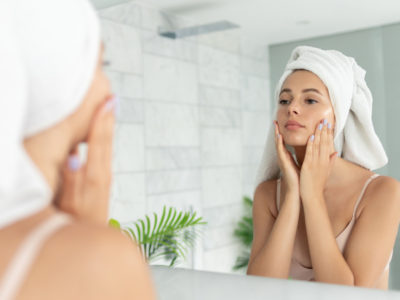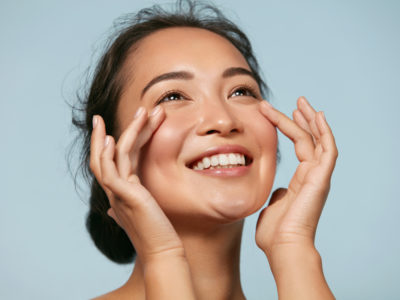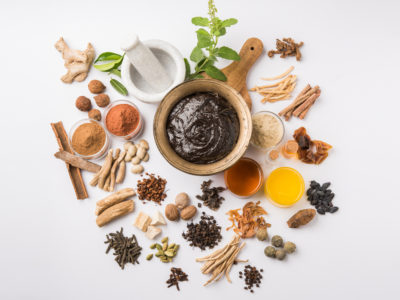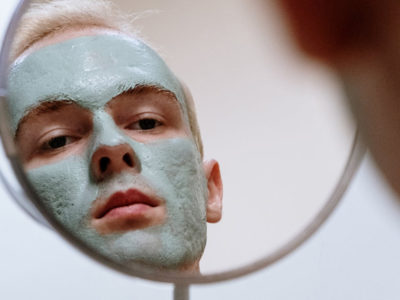Table of Contents[Hide][Show]
Chemicals That May Harm Your Health+−
- 1. Formaldehyde and Formaldehyde-Releasing Preservatives
- Is Non-Toxic Makeup also Natural and Organic?
- 2. Parabens
- 3. Phthalates
- 4. Toluene
- 5. Sodium Lauryl Sulfate (SLS)
- 6. Polyethylene Glycol (PEG)
- 7. Triclosan
- 8. Ethanolamine Compounds (MEA, DEA, and TEA)
- 9. 1,4-Dioxane
- 10. Benzophenone and Related Compounds
Natural and Safe Chemicals That Benefit the Skin+−
- Best 5 Ayurvedic Herbs For Acne That Really Work
- 1. Aloe Vera
- 2. Coconut Oil’s Medium-Chain Fatty Acids and Vitamin E
- 13. Hyaluronic Acid
- 14. Herb-Infused Oils
- How to Identify a Hormone Imbalance
- Anti Aging Skin Care: The 7 Best Remedies for Removing and Preventing Age Spots
- Best 5 Ayurvedic Herbs For Acne That Really Work
Ever wonder which chemicals that the skin absorbs go easily into your bloodstream? Here are fourteen chemicals which can affect your health positively or negatively.
Chemicals That May Harm Your Health
There are various chemicals in skincare, hair, beauty, and personal hygiene products. Some of these chemicals can be sneaky detriments to your health. A few of the following toxic ingredients have been banned in some countries, but are unfortunately still used in many products sold in the U.S. and elsewhere around the world. Here are some harmful chemicals to be on the lookout for the next time you go shopping.
1. Formaldehyde and Formaldehyde-Releasing Preservatives
Formaldehyde is a toxic, colorless, strong-smelling gas added to personal care products. If formaldehyde is not used directly, preservatives that release it are also used in many products.
It is a known carcinogen that has been shown to pose health risks, such as cancer development, skin irritation, burning sensations in the eyes, nose, and throat, coughing, nausea, and wheezing.
You can also find formaldehyde and the preservatives in:
- nail polish
- shampoos and liquid baby soaps
- nail glue
- eyelash glue
- hair gel
- hair-smoothing products
- baby shampoo
- body soap
- body wash
- colored cosmetics
Japan and Sweden have banned the use of formaldehyde in cosmetics and toiletries, and the European Commission has restricted its use in personal care products in the E.U. There are concentration restrictions in Canada but none in the U.S.
Look for and avoid formaldehyde, quaternium-15, dimethyl-dimethyl (DMDM) hydantoin, imidazolidinyl urea, diazolidinyl urea, sodium hydroxymethylglycinate, and 2-bromo-2-nitropropane-1,3-diol (bromopol) in any ingredients list.
Related
Is Non-Toxic Makeup also Natural and Organic?
Sort out the non-toxic makeup brands from the pretentious ones. Read on to understand the buzzwords and learn how to choose natural, organic, non-toxic makeup and personal care products.
2. Parabens
Parabens are toxic ingredients that can be found in almost all care and beauty products. This includes deodorant, soap, lotion, and just about any cosmetic. Parabens are harmful because they are hormone disruptors. Specifically, they are endocrine disruptors which means that they mimic estrogen in the body and lead to hormonal imbalances which could possibly cause breast cancer.
Examples of this substance have the word paraben at the end (methylparaben) so you know what to search for and avoid where possible.
3. Phthalates
Phthalates are plasticizers that affect texture by making products more flexible. They are mainly used in fragrances or parfum, but are also heavily used in hairspray and nail polish. Phthalates are also known to cause hormone disruption. They can also lead to reproductive issues and birth defects.
Examples of what to look for and avoid include DBP, DEHP, and DEP. The most common one to watch out for is Dibutyl phthalate.
4. Toluene
Toluene (aka BHT) is a harmful ingredient typically found in nail polish and hair dye. This solvent is toxic to the immune system and liver. It’s also acutely dangerous if you are pregnant as it can cause birth defects.
You can avoid toluene by looking for products that are “3 free” or higher.
5. Sodium Lauryl Sulfate (SLS)
This harsh sulfate is usually found in personal hygiene products such as soap, face wash, toothpaste, and shampoo. It can cause skin irritation and is a known allergen. It can also disrupt the endocrine system.
SLS contains carcinogens called nitrosamines that are byproducts of the sulfation process. Chronic exposure to nitrosamines can lead to cancer as well as liver and kidney damage.
You can easily check for this on product labels by looking for “sodium lauryl sulfate/sulphate” or “SLS.”
6. Polyethylene Glycol (PEG)
This toxic cosmetic ingredient is used as a thickener. It’s generally found in lotions, moisturizers, sunscreen, and other creamy beauty products. They are also found in hair dyes.
There are multiple types of PEGs but the most common one is PEG-10 Laurate which, like many other harmful chemicals on this list, negatively affects hormone health. They are also known skin irritants.
PEGs usually contain other dangerous ingredients like ethylene oxide, which is a carcinogen, and 1,4 Dioxane (which is a little further down on this list).
7. Triclosan
Triclosan is in a bit of a grey area legally. It was banned by the FDA, but only in soaps. It’s still legal for use in other products, and is typically used as an antibacterial, antiperspirant, or preservative.
Like most of the toxic chemicals we’ve discussed, triclosan is a hormone disruptor and irritant. A 2018 study shows that it is linked to gut inflammation and tumor growth, so even if it hasn’t been banned in all products it should definitely be avoided.
8. Ethanolamine Compounds (MEA, DEA, and TEA)
Ethanolamines are added to a lot of cosmetics and personal care products and have been linked to liver tumors. The Center for Environmental Health found Cocamide DEA in 98 shampoos, soaps, and other personal care products sold by major U.S. retailers.
You can find ethanolamines in:
- hair conditioners and dyes
- lotions
- shaving creams
- paraffin and waxes
- pharmaceutical ointments
- sunscreens
- eyeliners, mascara, eye shadows, blush, foundations, and makeup bases
Ethanolamines are prohibited in cosmetics due to concerns about the formation or chemistry of carcinogenic nitrosamines by the European Commission.
What should you look for and avoid? These toxic chemicals: DEA, TEA, and MEA.
9. 1,4-Dioxane
This chemical has been found in as many as 22% of 25,000 cosmetic products, but you won’t see it on any labels!
Companies manufacturing these products do not mark it on ingredient labels because it’s a contaminant created during the process of mixing common ingredients together.
It’s found in products that create suds, shampoo, liquid soap, bubble bath, and hair relaxers, and has been linked to cancer.
Pregnant women, infants, and teenagers are the most vulnerable to this chemical. Canada has already banned the use of cosmetics with this chemical.
To protect yourself from 1,4-dioxane, look for products that have been certified under the USDA National Organic Program and avoid those that contain sodium laureth sulfate, PEG compounds, clauses xynot, ceteareth, and oleth.
10. Benzophenone and Related Compounds
Benzophenone is used in the processes of creating products like moisturizers, foundation, baby sunscreens, lip balm, nail polish, shampoo, and conditioner.
They have been linked to cancer, endocrine disruption, developmental and reproductive toxicity, and organ system toxicity.
Benzophenone, benzopenone-2, benzophenone-3, benzophenone-4, and benzophenone-5 are a group of harmful chemicals restricted in cosmetics in the U.S., and oxybenzone is restricted in cosmetics at up to 10% concentration in the European Union.
To protect your health, look for and avoid all of the above benzophenones as well as sunscreens that rely on non-nanosized zinc oxide or titanium dioxide.
Natural and Safe Chemicals That Benefit the Skin
Although you might hear the word chemical and associate it with poison or a synthetic compound, there are plenty of natural chemicals hanging around our planet that are beneficial and promote healthier skin.
The exact definition of a chemical is “a distinct compound or substance, a special one, which has been artificially prepared or purified.” So, water, table sugar, and citric acid are all natural chemicals! These are the kinds of ingredients you will find in safe cosmetics.
Related
Best 5 Ayurvedic Herbs For Acne That Really Work
Is acne giving you trouble and none of the regular treatments work? Learn how Ayurveda herbs for acne have been healing skin problems years.
1. Aloe Vera
While you might not class aloe vera as a chemical, aloe vera gel actually contains various good chemicals, including two hormones: auxin and gibberellins.
These hormones are wonderful skin chemicals that help in wound healing and have a potent anti-inflammatory action.
Aloe vera also contains polyphenols that work to inhibit the growth of bacteria-causing infections and inflammation. Studies have also shown that the compound in aloe improves facial wrinkles and elasticity.
Another skin benefit of aloe vera is it’s a great natural moisturizer primarily because it contains mostly water. Aside from that, a study showed that the polysaccharide-rich composition of the plant contributes to the hydrating effects it gives to the skin.
Upon moisturizing the skin, aloe vera extract softens it without clogging the pores. It’s also suitable for an aftershave treatment as it hydrates the skin and aids in healing razor burn.
You can choose organic products which contain aloe vera extracts to get the benefits of the plant if you want to use it on your face, like aloe vera face masks for example.
2. Coconut Oil’s Medium-Chain Fatty Acids and Vitamin E
There are three fatty acid compounds in coconut oil that are beneficial to your skin: lauric acid, capric acid, and caprylic acid.
Lauric acid has antiviral, antibacterial, and antiprotozoal properties. It can be helpful for destroying lipid-coated viruses, such as herpes.
Capric acid is antimicrobial, too, and also antibacterial, antifungal, and anti-inflammatory, fighting candida, skin infections, and acne.
Medium-chain fatty acids permeate cell membranes easily, and when applied to the skin, they keep it smooth to the touch, retaining the moisture content of the skin.
Taking coconut oil internally also benefits the skin, as the fat deposits under the skin can give it an even tone by reducing the appearance of large pores.
In studies, coconut oil has been shown to benefit xerosis, a skin condition characterized by dry, rough, scaly, and itchy skin and may be helpful in wound healing.
On top of the oil’s fatty acids, it also has vitamin E which is known to be a potent skin-repairing antioxidant, helping reduce the appearance of scars and stretch marks. You can apply the oil on the areas of stretch marks at least twice daily to help them fade away.
The vitamin can aid in keeping the skin supple and moisturized indirectly, too, as it lives in the cell membranes and protects them.
High levels or a high degree of vitamin E in the body contributes to slowing down the signs of skin aging as it neutralizes free radicals caused by many pollutants in the environment.
To benefit from this wonderful oil, look for organic products that contain cold-pressed coconut oil. Ann Marie Gianni uses coconut oil in their Aloe Herb Cleanser.
13. Hyaluronic Acid
Though it sounds like a chemical you wouldn’t want to put on your skin, hyaluronic acid is produced by the body naturally and helps retain collagen, increases moisture, and provides elasticity and flexibility.
In studies, it has been shown to be a key molecule in managing skin aging, treating wrinkles, improving hydration, and increasing elasticity. It is also beneficial for treating cold sores and providing sunburn relief.
The acid can also help speed up wound healing as it regulates inflammation levels and signals the body to create more blood vessels in affected areas. A study revealed that applying hyaluronic acid to skin wounds can reduce wound size and can decrease pain quickly.
To benefit from hyaluronic acid’s properties, it requires looking for skincare products fortified with high-quality hyaluronic acid.
As mentioned above, Ann Marie Gianni produces some wonderful products that we confidently recommend, including her Anti-Aging Serum which is powered by hyaluronic acid.
14. Herb-Infused Oils
If you thought aromatic herbs and essential oils were added to skincare products for their scent, you’d be right. However, these are not synthetic fragrances. These herbs and essential oils contain extremely complex natural compounds that go wild in your body and on your skin and can heal a variety of skin complaints.
One of the top essential oils for your skin is rose. Rose is especially soothing for dry and aging skin and has antimicrobial and anti-inflammatory compounds that can help conditions like psoriasis and dermatitis. One study even found inhaling rose essential oil inhibited water loss in the skin.
Ashwagandha is not a common herb you might see as a skincare ingredient but quality products will include it. Ashwagandha fights the signs of aging, heals wounds, soothes rough and dry skin, and stimulates collagen production.
Another example of herb-infused oil is rosemary oil. A study found out that the oil can help improve skin hydration and elasticity when applied or used regularly as one of the components of your skincare products.
The oil also has antiseptic and antimicrobial properties that may contribute to the elimination of acne and oily skin. It can also aid in removing skin dryness and toning the skin when applied topically or used as a massage oil.
To improve or develop your skin healthily using these natural substances, look for organic herb-infused oils that include cutting-edge superfoods and high-quality essential oils and extracts.
You can also pick good-quality dried herbs if you want the best results or look for high-quality skincare solutions as they can last longer and will not contribute to spoilage.
Another useful tip is to add vitamin E oil or extract on these herb-infused oils to preserve them. The vitamin is not a preservative, but it is an antioxidant that can help prolong the shelf life of the oils.
Final Thoughts
Knowing which chemicals to avoid and to use will guide you on what skincare products to include in your beauty regimen. Buy brands that are known to sell clean beauty skin care and hair products. Always look for organic and natural ingredients in the products to get the maximum health benefits or skin innovation you deserve.
You May Also Like…
Editor’s Note: This post was originally published on April 18, 2017, and has been updated for quality and relevancy most recently on October 28, 2021.






